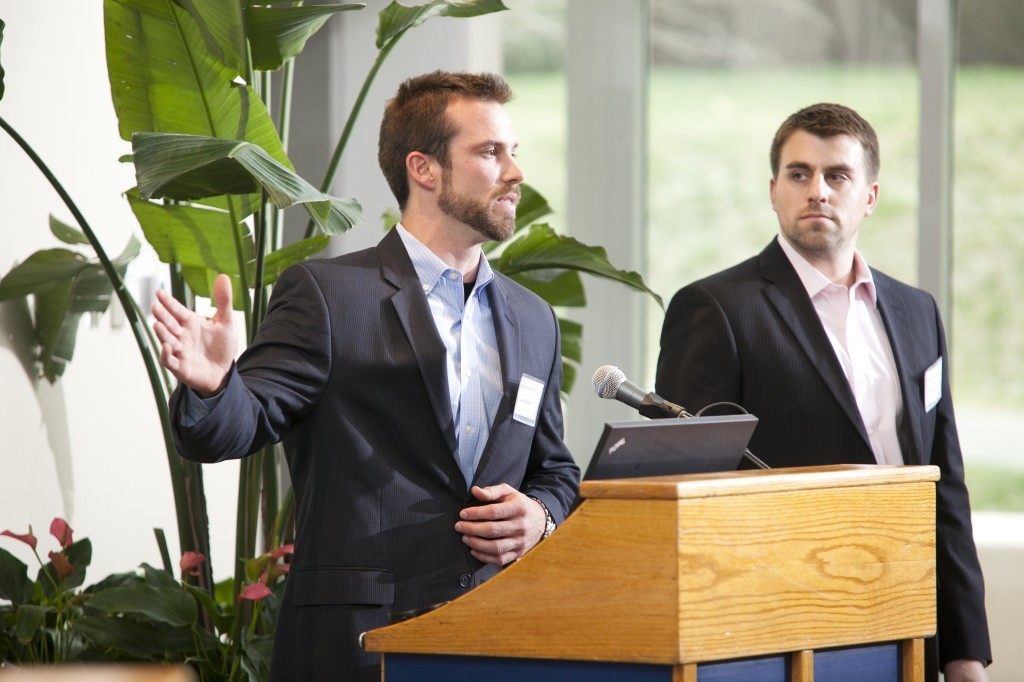This post was written in July 2013 by Jack Beuttell, a joint MBA/MEM student who will graduate from Duke in 2014, and David Nicola, who recently graduated with his MBA from Fuqua. Jack and David were the inaugural winners of the CASE Seed Prize, which allowed them to pursue their social venture, AgImpact Fund, during the summer of 2012. Jack and David reflect on their experience as social entrepreneurs at Fuqua.
Last summer, we were thrilled to be the inaugural winners of the CASE Seed Prize – a $10,000 grant, plus one-on-one coaching to help us propel our social venture forward. Almost a year later, we’re still working on AgImpact Fund and wanted to reflect on how we’ve progressed with the support of the social entrepreneurship community at Duke.
Trailing on the momentum of the CASE Seed Prize, we spent last summer crisscrossing North Carolina by car—and the continent by telephone—speaking with farmers, agricultural extension agents, food aggregators, agriculture non-profits, conservation land trusts, attorneys, former U.S. government officials, for-profit investment funds, real estate and impact investors, and foundations, among others.
It was not your traditional summer internship. We didn’t report to anyone or get instructions on how to spend our time. While the rest of our classmates were working in blue-chip consulting firms, investment banks and other summer MBA posts, we were pounding the pavement as entrepreneurs, studying the agricultural value chain.
Today, AgImpact is an impact-oriented farmland private equity concept that applies investor money to partner with small and medium-sized organic farmers in the Southeastern region. The fund serves as a mechanism to facilitate the transition of land from one generation to the next—keeping land in production—and from conventional practices to more sustainable practices.
But AgImpact is very different today than when we began. In fact, we’ve iterated the idea through several “chapters,” actively evolving it into something we believe is solid and viable. This amount of progress would simply not have been possible without the funding support of the CASE Seed Prize, which provided us with enough financial flexibility to devote last summer to testing our investment thesis and developing a more thoroughly vetted idea.
The freedom of full attention allowed us to progress quickly over the break. We held meetings with and distributed our materials to several hundred individuals, taking in essential feedback at every turn. Along the way we learned several valuable lessons:
- There is no substitute for effort and time. The more time you spend on an idea the more questions there are to be answered. Before you know it, your world is consumed by the idea, and you’re searching for more bandwidth. Working full-time on an idea is a luxury, but also a necessity in many cases.
- Be humble enough to adapt. Sitting alone in your room and brainstorming is a great exercise, but you need to test your ideas with real people in real places. Get out there and be willing to let go of your brilliance. Share it and when you do, you may realize the idea wasn’t that brilliant after all, or you may discover a stronger variation of it.
- Transparency is essential. There are three ideas here. One is that, as a student entrepreneur, you have unique access to people you would not have access to as a non-student. This is a privilege that should not be abused. Second, in our opinions social entrepreneurship demands a higher level of transparency than the status quo. That is, if you’re goal is to change the world and you have a great idea for how to do it, don’t hoard it, share it. Find ways to increase the size of the pie, not just the slice with your name on it. Third, openness ultimately leads to a better end product because you need partners and advocates to progress.
- Be prepared for anything. When you enter the world of entrepreneurship, you open a new door to competition and sensitivities. The influence of egos and agendas becomes more apparent and can catch you off-guard if you’re not alert. Defensive may not be the right posture, but prepared is always good.
- Partnerships are delicate but powerful. We are fortunate to have found in each other a business partner whose skills and personality are complementary. Spending so much time with another person is not easy, but if you find the right fit, it can work really well and make the process of starting a business enjoyable rather than frustrating.
The Seed Prize and the support that was offered by CASE (our sincere thanks to Dan Heath for his invaluable mentorship as well as Matt Nash, Cathy Clark, Erin Worsham, John Buley, and the rest of the CASE team) gave us the momentum and confidence we needed to take the idea to the next level.
We were two-time finalists in the International Impact Investing Challenge, in which we presented before a panel of impact investors and foundations, bringing home a briefcase full of valuable contacts and ideas. We presented to Jessica Jackley, co-founder of Kiva, were regional finalists in the Global Social Venture Challenge and the Walmart Better Living Business Plan Competition, and semi-finalists in the Duke Start-Up Challenge Business Plan Competition. All of these experiences have helped advance AgImpact Fund and have provided invaluable experience in a safe environment.
Where are we today? We have a pilot project in western North Carolina that is ready for investment. We’re meeting with several impact investors and high-net-worth individuals that have expressed an interest in what we’re doing. And we hope to have completed our first deal in the next six months.

